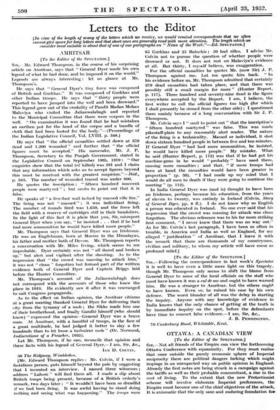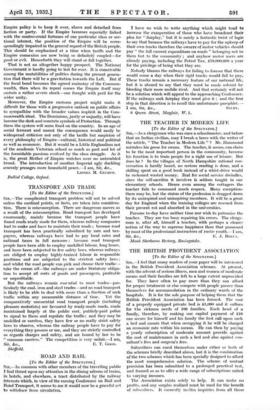OTTAWA: A CANADIAN VIEW
[To the Editor of the SPECTATOR.] SIR,—Not all friends of the Empire can view the forthcoming Ottawa Conference with equanimity. For they must realize that once outside the purely economic sphere of Imperial reciprocity there are political dangers lurking which might impinge in an unexpected way on public opinion in England. Already the first notes are being struck in a campaign against the tariffs as well as their probable concomitant, a rise in the cost of living. To the extent that the new Protectionist scheme will involve elaborate Imperial preferences, the Empire must become one of the chief objectives of the attack, It is axiomatic that the only sane and enduring foundation for, Empire policy is to keep It over, above and detiched frcim faction or party. If the Empire becomes especially linked with the controversial fortunes of one particular class or sec- tional interest, the position of the Empire will be corre- spondingly impaired in the general regard of the British people. This should be emphasized at a time when tariffs and the Empire connexion are now being so definitely., coupled—for good or evil. Henceforth they will stand or fall together.
That is not an altogether happy prospect. The National Government is hardly going to last for ever. It is conceivable among the mutabilities of polities during the present genera- tion that there will be a gravitation towards the Left. But if the fiscal bond becomes the agreed mainstay of the Common- wealth, then when its repeal comes the Empire itself may sustain a rather severe shock—one fraught with peril for the wider unity.
Moreover, the Empire customs project might make it difficult for those with a progressive outlook on public affairs to sympathize with the broader values implicit in the Com- monwealth ideal. The Dominions, justly or unjustly, will have become the dark and concrete symbols of Protection. Through them the system will seem fixed on the country. In an age of social ferment and unrest the consequence would easily be widespread criticism not only of the tariffs but suspicion of every philosophy of Empire—cultural, historical and political as well as economic. But it would be a Little Englandism not of the academic Victorian school so much as part and lot of the formidable passions evolved by the class struggle. As it is, the great Mother of Empire watches over no untroubled brood. The introduction of another Imperial ugly duckling scarcely presages more household peace.—I am, Sir, &c.,
Balliol College, Oxford.
L/ONEL M. GELBER.







































 Previous page
Previous page